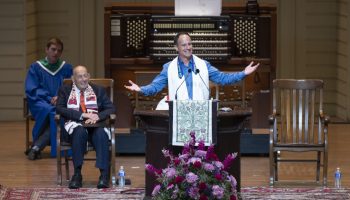Two weeks ago, the U.S. Supreme Court handed down a decision in the most improbable “blockbuster” case of its 2016 term: In an appeal that was ostensibly about a state program repurposing used rubber tires in playground surfaces for religious daycares, the high court may have opened the door to increased state funding for religious institutions. The facts of Trinity Lutheran Church v. Comer are straightforward: a church that houses a religious preschool sought access to a Missouri state program that offers rubberized playground surfaces to protect children’s safety. Missouri — like 37 other states whose constitutions explicitly prohibit the funding of religious institutions — said the church, an otherwise outstanding candidate for the program, did not qualify. The church sued.
In a 7-2 opinion handed down on the last morning of the term, the Supreme Court held that excluding religious groups from state funding programs of this sort represented discrimination based on religion. For the first time, the Supreme Court ruled that state governments must provide money directly to a house of worship, which may open the floodgates to challenges around state funding for religious schools, including voucher programs.
To read the majority, concurring and dissenting opinions is to enter a swirling vortex of uncertainty: This case either represents a minor course correction to discourage states from discriminating against secular programs at houses of worship, a massive opening of the floodgates for state funds into church coffers, or a substantial erosion of the wall that separates church and state.
Chief Justice John Roberts, who authored the majority opinion, wrote that this case was about discriminating against religious entities simply because they were religious: Missouri, he wrote, “puts Trinity Lutheran to a choice: It may participate in an otherwise available benefit program or remain a religious institution.” Roberts was careful to limit the decision to programs that — in his view — have absolutely nothing to do with promoting religion. He even dropped a footnote to clarify that this ruling was about slides and jungle gyms: “This case involves express discrimination based on religious identity with respect to playground resurfacing. We do not address religious uses of funding or other forms of discrimination.” But Roberts did not find a five-justice majority for his caveat. Indeed, two justices — Clarence Thomas and Neil Gorsuch, the newest justice — would have gone much further. They wrote separately to note that they would have allowed the church to access state funding whether the money went to protect secular playground safety or for explicitly religious purposes; to do anything less would be a burden on the Free Exercise Clause of the First Amendment.
Justice Sonia Sotomayor — dissenting only for herself and Ruth Bader Ginsburg — sees this development as directly undermining the state prohibition on establishing sectarian religion. The church’s playground facilities, she wrote, “are used to assist the spiritual growth of the children of its members and to spread the Church’s faith to the children of nonmembers. The Church’s playground surface — like a Sunday School room’s walls or the sanctuary’s pews — are integrated with and integral to its religious mission.” Do not be fooled by the majority’s claims of minimalism, she wrote: the Supreme Court holds for the first time “that the Constitution requires the government to provide public funds directly to a church.” She warns, direly, that the majority opinion “leads us to a place where separation of church and state is a constitutional slogan, not a constitutional commitment.”
In the final analysis, the future significance of Trinity Lutheran may be more a matter of prophecy rather than of close textual analysis: There are now clearly several votes on the court to extend a project of ensuring that churches will receive more taxpayer benefits, without being subject to, for example, anti-LGBT discrimination laws. There are countervailing votes to scrupulously police the wall between church and state. And there seem to be several votes at the middle to reserve the meaningful sectarian bloodshed for a future date — and in the interim to limit the numbers of scraped knees on the playground.
But last year’s Solomonic compromises cannot stave off a term that will open next October with crucial religion cases already on the docket: The high court has agreed to hear an appeal from a Colorado cake baker who argues that his Christian faith precludes him from providing a wedding cake to a same-sex couple. This will be a crucial moment in an oncoming constitutional collision between state antidiscrimination laws and individual claims of religious liberty. The court has also agreed to hear and decide the challenges to President Donald Trump’s travel ban from six majority-Muslim countries; appeals claiming that the ban is impermissibly tainted by unconstitutional religious animus.
When we talk about crises of faith, we tend to think in terms of the most intimate, personal and spiritual choices; our private struggles over our own souls and beliefs. But there is a looming crisis of faith playing out upon the national stage as well, about balancing constitutional claims that live in uneasy tension with themselves, and accommodating the beliefs of those who dissent from civil rights laws. As we struggle to find new ways to listen and make space for believers, nonbelievers and religious dissenters in a nation as divided about religion as it is about most things, the courts will be setting up the new rules for how we can do that together, and whether it can be done at all.
Dahlia Lithwick is a senior editor at Slate and, in that capacity, writes the “Supreme Court Dispatches” and “Jurisprudence” columns. Frequently, that writing includes the intersection of issues of faith and issues of legality. Her work has appeared in The New York Times, Harper’s, The Washington Post and Commentary, among other places.




